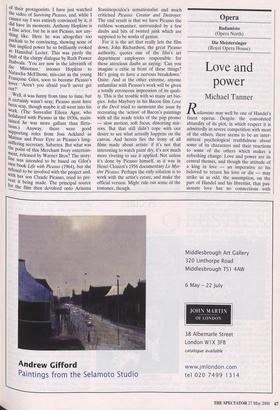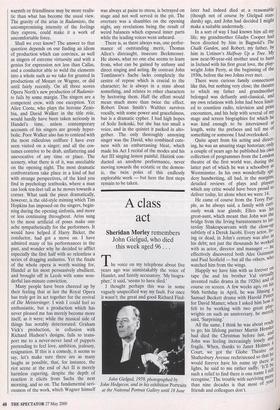Opera
Love and power
Michael Tanner
Radamisto may well be one of Handel's finest operas. Despite the convoluted absurdity of its plot, in which respect it is admittedly in severe competition with most of the others, there seems to be an inter- mittent psychological truthfulness about some of its characters and their reactions to some of the others which makes a refreshing change. Love and power are its central themes, and though the attitude of a king in love — an imperative to his beloved to return his love or die — may strike us as odd, the assumption, on the part of Handel and his librettist, that pas- sionate love has no connections with warmth or friendliness may be more realis- tic than what has become the usual view. The gravity of the arias in Radamisto, the uncompromising intensity of the feelings they express, could make it a work of uncomfortable force.
Shall we ever know? The answer to that question depends on our finding an idiom of production which can convince, as well as singers of extreme virtuosity and with a genius for expression not less than Callas, and a conductor able to weld the elements into a whole such as we take for granted in productions of Mozart or Wagner, or did until fairly recently. On all three scores Opera North's new production of Radamis- to fails by some margin. The singers are a competent crew, with one exception. Yet Alice Coote, who plays the heroine Zeno- bia, and David Walker in the title role, would hardly have been taken seriously in Handel's time, unless contemporary accounts of his singers are grossly hyper- bolic. Poor Walker also has to contend with the most ridiculous coiffure I have ever seen visited on a singer; and all the cos- tumes contrive to be drab, unflattering and unevocative of any time or place. The scenery, what there is of it, was unreliable on the opening night. The most dramatic confrontations take place in a kind of but with strange perspectives, of the kind you find in psychology textbooks, where a man can look ten-feet tall as he moves towards a corner. What sank the piece dramatically, however, is the old-style miming which Tim Hopkins has imposed on the singers, begin- ning during the opening sinfonia, and more or less continuing throughout. Arias sung to the most artificial of poses make one ache sympathetically for the performers. It would have helped if Harry Bicket, the conductor, had got a move on. I have admired many of his performances in the past, and wonder why he decided to afflict especially the first half with so relentless a series of dragging andantes. Yet the finale of the whole opera is worth waiting for, Handel at his most persuasively ebullient, and brought off in Leeds with some won- derful last-minute conviction.
Many people have been cheered up by their feeling that at last the Royal Opera has truly got its act together for the revival of Die Meistersinger. I wish I could feel so enthusiastic, but a production which has never pleased me has merely become more itself, as it were; while the musical side of things has notably deteriorated. Graham Vick's production, in collusion with Richard Hudson's designs, fails to trans- port me to a never-never land of puppets pretending to feel love, ambition, jealousy, resignation. If this is a comedy, it seems to say, let's make sure there are as many laughs as possible, that, for instance, the riot scene at the end of Act II is merely harmless capering, despite the depth of reaction it elicits from Sachs the next morning, and so on. The fundamental seri- ousness of the work, which Wagner himself was always at pains to stress, is betrayed on stage and not well served in the pit. The overture was a shambles on the opening night, any revelations being the result of weird balances which exposed inner parts while the leading voices went unheard.
There is, as there always was, one perfor- mance of outstanding merit, Thomas Allen's distraught, insecure Beckmesser. He shows, what no one else seems to learn from, what can be gained by unfussy and direct singing and acting. By contrast John Tomlinson's Sachs lacks completely the centre of repose which is crucial to the character; he is always in a state about something, and relates to other characters by hectoring them. Half the effort would mean much more than twice the effect. Robert Dean Smith's Walther survives vocally, with some power and gracefulness, but is a dramatic cypher. I had high hopes of Soile Isokosld, but she has too small a voice, and in the quintet it packed in alto- gether. The only thoroughly annoying singer was the David, who combined cute- ness with an embarrassing bleat, which made his Act I recital of the modes and his Act III singing lesson painful. Haitink con- ducted an anodyne performance, never moving towards the ecstatic or the demon- ic, the twin poles of this endlessly explorable work — but here the first steps remain to be taken.



































































 Previous page
Previous page